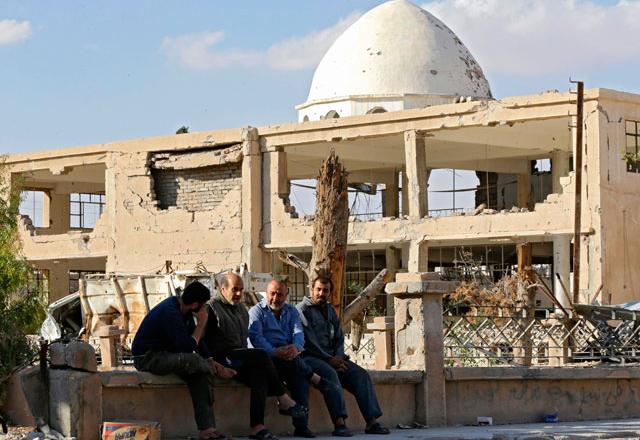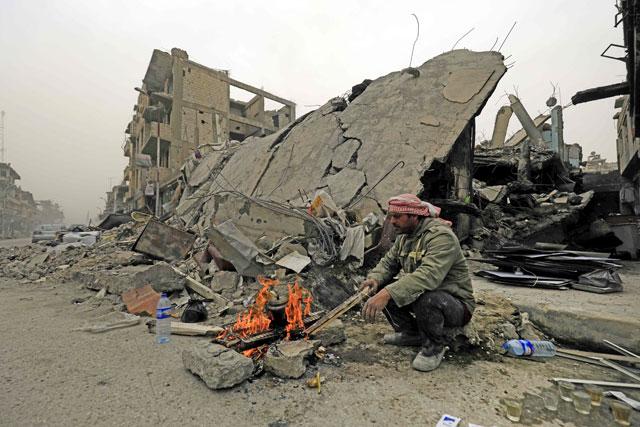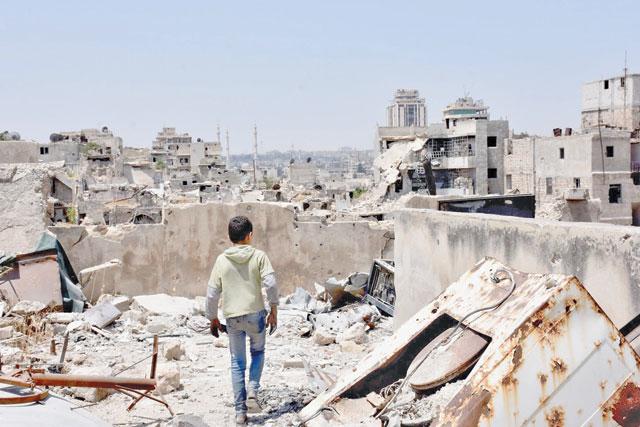You are here
Fresh Syria talks open in Astana
By AFP - Oct 30,2017 - Last updated at Oct 30,2017

Syrian men sit outside a damaged mosque in the desert town of Al Qaryatain on Sunday after regime forces retook it from the Daesh terror group (AFP photo)
ASTANA, Kazakhstan — A fresh round of peace talks seeking to end Syria's war opened in the Kazakh capital Astana on Monday, as part of a Moscow-led push supported by Iran and opposition backer Turkey.
The latest round of talks begins days after the Daesh terror group was forced out of its de facto capital Raqqa in northern Syria, in a major victory for the US-backed Kurdish-Arab Syrian Democratic Forces.
Recent rounds of talks in the Central Asian nation have focused on ironing out the details of a Russia-led plan for four de-escalation zones in Syria.
"Closed-format talks have begun," Kazakh foreign ministry spokesman Anuar Zhainakov told AFP, adding that the two-day negotiations would conclude with statements to the press.
Zhainakov confirmed that delegations from the Syrian government and the rebels seeking President Bashar Al Assad's overthrow had arrived in Astana, as had negotiators from Turkey and regime backers Russia and Iran.
Despite backing opposite sides in the war, Ankara and Moscow have been working closely on Syria since a 2016 reconciliation ended a crisis caused by the shooting down of a Russian war plane.
A de-escalation zones plan was first tabled in Astana in May to minimise fighting between government forces and moderate rebel factions, as well as improve access for aid for civilians living in the zones.
But international organisations painted the humanitarian situation in Eastern Ghouta — covered by the zones deal and located just outside the capital Damascus — in dire terms earlier this month.
UNICEF says over a thousand children in the area are suffering from severe, acute or moderately acute malnutrition, with over 1,500 more at serious risk, as aid convoys have failed to reach needy populations.
While the de-escalation zones brought about an initial reduction in fighting, the International Red Cross has voiced concern that the violence has intensified again, including in the zones.
Buffer zone
Previous rounds of Astana negotiations have ended without major breakthroughs, but they have made more progress than the parallel UN-driven talks on Syria in Geneva.
The last round of talks in September saw Russia, Turkey and Iran agree to jointly police a buffer zone in the contentious northern province of Idlib, where Ankara and Tehran are viewed as having competing interests.
Zones covering part of the south of the country, Eastern Ghouta, and the central province of Homs had already been agreed during a previous round of talks. Russian military police were then deployed to secure the areas.
Syria's United Nations envoy Staffan de Mistura urged parties to move on from the zones towards "a more stable political settlement" during a mid-October visit to Moscow.
The next round of Geneva talks will begin on November 28, De Mistura has said.
Russia's military intervention two years ago in the Syrian war that has claimed more than 330,000 lives to date turned the tables in Assad's favour.
But rebels still insist on Assad's removal from power as a principal term for any peace deal.
Related Articles
ASTANA — Syria's opposition on Thursday said it was more important "than ever before" that Russia push Bashar Assad's government towards a p
ASTANA, Kazakhstan — Major powerbrokers agreed Friday to hold a peace congress for Syria in Russia's Black Sea resort of Sochi in late Janua
DAMASCUS — Syria's army announced Saturday a halt in fighting in parts of Eastern Ghouta after rebels and regime ally Russia agreed on how a


















